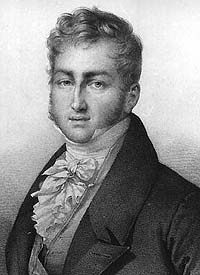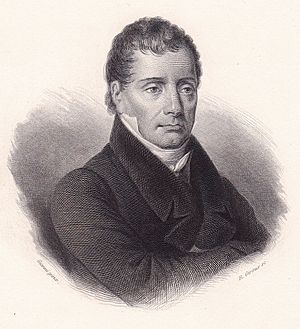Address of the 221 facts for kids
The Address of the 221 was a special message sent to King Charles X of France. It was given by the Chamber of Deputies, which was like the French parliament, on March 18, 1830. This message showed that the majority of the deputies, 221 of them, disagreed with the king's government, led by Jules, prince de Polignac. This disagreement was a big step towards the July Revolution that happened soon after.
Contents
How It All Started
Martignac's Government
After elections in late 1827, a group called the Liberals gained the most seats in the Chamber of Deputies. Even though it wasn't what they usually wanted, they agreed to let a less strict Liberal, Viscount of Martignac, lead the government. His government started in January 1828. They tried to pass some new laws that the Liberals liked. But they couldn't stop the growing support for more liberal ideas. Martignac eventually resigned after losing a vote on how local governments should be organized.
Polignac Takes Over
King Charles X was getting tired of what he saw as too much power from the Liberals. He decided to choose his own leader for the government, even though the Liberals had the most votes in parliament. On August 8, 1829, King Charles X picked Jules de Polignac to be his Foreign Minister. Polignac was a close friend of the king and a leader of the Ultra-royalists, a group who wanted the king to have more power. Polignac quickly became the most important person in the government. By November, he was the Prime Minister.
The Power of Newspapers
When Polignac's government started, a new newspaper called Le National began publishing on January 3, 1830. Important writers like Thiers and Carrel worked for it. This newspaper became a strong voice for liberal ideas. It joined other popular newspapers like Le Globe and Le Temps. There were also more moderate liberal papers such as Le Constitutionnel and the Journal des Débats. All these newspapers helped spread the opposition's message.
The Address of the 221
Debating the Address
A special group of deputies wrote the Address of the 221. The Chamber of Deputies discussed it on March 15 and 16. It was a clear message that they did not trust Polignac's government. More importantly, it was a request to change the country's main rules, called the Charter, to give parliament more power.
The Vote: 221 Say Yes
On March 16, the Chamber of Deputies voted on the address. Out of about 402 deputies who voted, 221 voted for it, and 181 voted against it. This meant the address was approved! A Liberal deputy named Méchin, who was close to Louis Philippe I, quickly ran to the Palais-Royal. He wanted to tell Louis Philippe the news right away.
King Charles X's Response
The King Hears the Address
Two days later, on March 18, King Charles X met with the deputies at the Tuileries Palace. The President of the Chamber, Royer-Collard, read the address to the king. It started by thanking the king for his trust. It also promised the deputies would be loyal and do their duties.
What Happened Next?
The king and the deputies were now in a serious disagreement. King Charles X decided to take strong action, but he tried to stay within the rules of the Charter of 1814.
- The very next day, March 17, he ordered that the parliament's meeting be put off until September 1. This was allowed by Section 50 of the Charter. This rule was meant to give time for disagreements to calm down. However, there was no easy way for the Liberals and the Ultra-royalists to agree, as both sides had very strong views. King Charles X was not willing to compromise.
- King Charles X continued to follow the path allowed by Section 50. On May 16, 1830, he closed the assembly and called for new elections. He hoped the people would elect deputies who supported him. But to his surprise, the Liberals won the elections on June 23 and July 19. They gained 274 seats, which was 53 more than before!
- Up to this point, King Charles X had followed the "constitutional" path. But he didn't have a plan for what to do if the elections didn't solve the problem. He and Polignac decided to use Section 14 of the Charter. This section said the king could make rules and orders needed for the "security of the state." They used this to make new laws called the July Ordinances on July 25. These laws greatly angered the majority of the deputies and the people. This led directly to the July Revolution.
See Also
- Charles X of France
- Louis Philippe I
- Bourbon Restoration
- Charter of 1814
- Ministry of Jules de Polignac
- July Revolution
- July Monarchy



